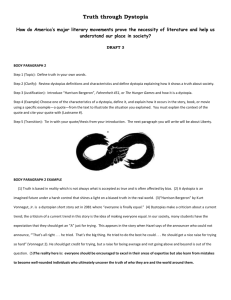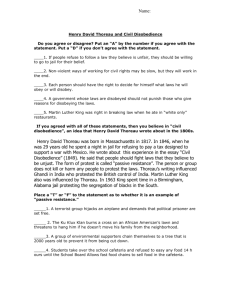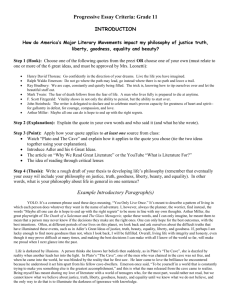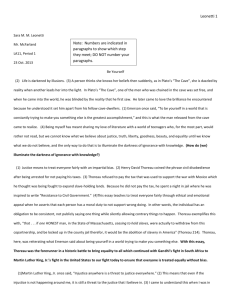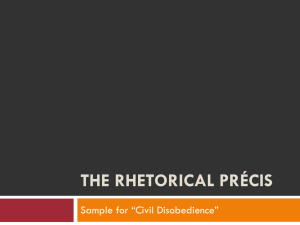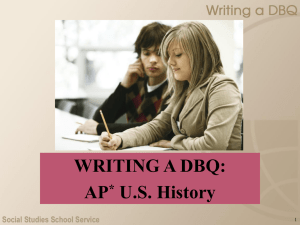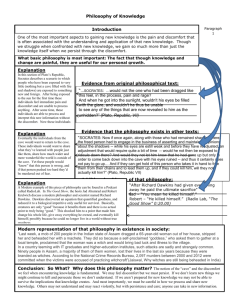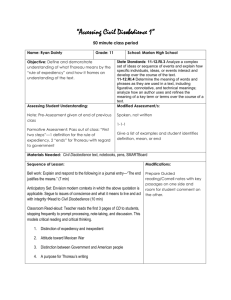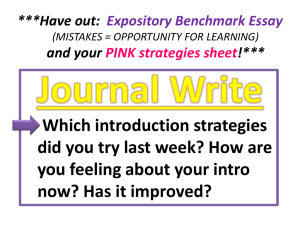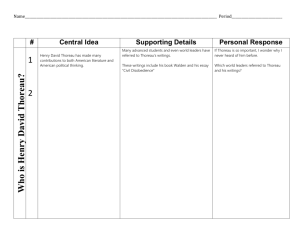Progressive Essay Criteria: Grade 11
advertisement
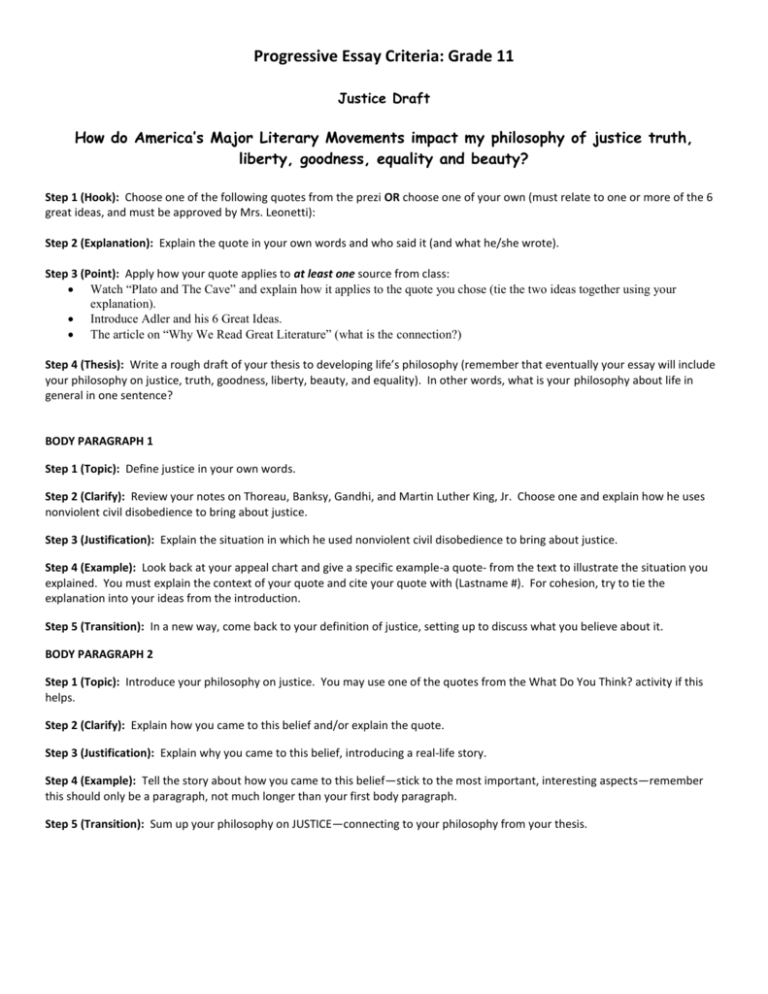
Progressive Essay Criteria: Grade 11
Justice Draft
How do America’s Major Literary Movements impact my philosophy of justice truth,
liberty, goodness, equality and beauty?
Step 1 (Hook): Choose one of the following quotes from the prezi OR choose one of your own (must relate to one or more of the 6
great ideas, and must be approved by Mrs. Leonetti):
Step 2 (Explanation): Explain the quote in your own words and who said it (and what he/she wrote).
Step 3 (Point): Apply how your quote applies to at least one source from class:
Watch “Plato and The Cave” and explain how it applies to the quote you chose (tie the two ideas together using your
explanation).
Introduce Adler and his 6 Great Ideas.
The article on “Why We Read Great Literature” (what is the connection?)
Step 4 (Thesis): Write a rough draft of your thesis to developing life’s philosophy (remember that eventually your essay will include
your philosophy on justice, truth, goodness, liberty, beauty, and equality). In other words, what is your philosophy about life in
general in one sentence?
BODY PARAGRAPH 1
Step 1 (Topic): Define justice in your own words.
Step 2 (Clarify): Review your notes on Thoreau, Banksy, Gandhi, and Martin Luther King, Jr. Choose one and explain how he uses
nonviolent civil disobedience to bring about justice.
Step 3 (Justification): Explain the situation in which he used nonviolent civil disobedience to bring about justice.
Step 4 (Example): Look back at your appeal chart and give a specific example-a quote- from the text to illustrate the situation you
explained. You must explain the context of your quote and cite your quote with (Lastname #). For cohesion, try to tie the
explanation into your ideas from the introduction.
Step 5 (Transition): In a new way, come back to your definition of justice, setting up to discuss what you believe about it.
BODY PARAGRAPH 2
Step 1 (Topic): Introduce your philosophy on justice. You may use one of the quotes from the What Do You Think? activity if this
helps.
Step 2 (Clarify): Explain how you came to this belief and/or explain the quote.
Step 3 (Justification): Explain why you came to this belief, introducing a real-life story.
Step 4 (Example): Tell the story about how you came to this belief—stick to the most important, interesting aspects—remember
this should only be a paragraph, not much longer than your first body paragraph.
Step 5 (Transition): Sum up your philosophy on JUSTICE—connecting to your philosophy from your thesis.
Sara M. M. Leonetti
Mr. McFarland
LA11, Period 1
23 Oct. 2013
Note: Numbers are indicated in paragraphs to show which step
they meet; DO NOT number your paragraphs. DO NOT include
your thesis question in your paper! This is just to help you
with cohesion.
Be Yourself
(2) Life is darkened by illusions. (3) A person thinks she knows her beliefs then suddenly, as in Plato’s “The Cave”, she is dazzled by
reality when another leads her into the light. In Plato’s “The Cave”, one of the men who was chained in the cave was set free, and
when he came into the world, he was blinded by the reality that he first saw. He later came to love the brilliance he encountered
because he understood it set him apart from his fellow cave-dwellers. (1) Emerson once said, “To be yourself in a world that is
constantly trying to make you something else is the greatest accomplishment,” and this is what the man released from the cave
came to realize. (4) Being myself has meant sharing my love of literature with a world of teenagers who, for the most part, would
rather not read, but we cannot know what we believe about justice, truth, liberty, goodness, beauty, and equality until we know
what we do not believe, and the only way to do that is to illuminate the darkness of ignorance with knowledge. (How do {we}
illuminate the darkness of ignorance with knowledge?)
(1) Justice means to treat everyone fairly with an impartial bias. (2) Henry David Thoreau coined the phrase civil disobedience
after being arrested for not paying his taxes. (3) Thoreau refused to pay the tax that was used to support the war with Mexico which
he thought was being fought to expand slave-holding lands. Because he did not pay the tax, he spent a night in jail where he was
inspired to write “Resistance to Civil Government.” (4)This essay teaches to treat everyone fairly through ethical appeal when he
asserts that each person has a moral duty to not support wrong doing. In other words, the individual has an obligation to be
consistent, not publicly saying one thing while silently allowing contrary things to happen. Thoreau exemplifies this with, “that . . . if
one HONEST man, in the State of Massachusetts, ceasing to hold slaves, were actually to withdraw from this copartnership, and be
locked up in the county jail therefor, it would be the abolition of slavery in America” (Thoreau 214). Thoreau, here, was reiterating
what Emerson said about being yourself in a world trying to make you something else. With this essay, Thoreau was the forerunner
in a historic battle to bring equality to all which continued with Gandhi’s fight in South Africa to Martin Luther King, Jr.’s fight in
the United States to our fight today to ensure that everyone is treated equally without bias.
(1)Martin Luther King, Jr. once said, “Injustice anywhere is a threat to justice everywhere.” (2) This means that even if the
injustice is not happening around me, it is still a threat to the justice that I believe in. (3) I came to understand this when I was in
Senior English Honors. In this class, we were assigned the book Cry, the Beloved Country. (4) This book is about apartheid in South
Africa. When I began reading the book, I knew next to nothing about the atrocities of the world, and I was shocked to discover that
this type of segregation could occur in a time much closer to my lifetime. It was then that I began to read about current world
events and discovered that issues like racism, segregation, and hate-crimes, which I believed to be a thing of the past, were, in fact,
still a very real part of the world. At first, I felt overwhelmed by this realization, and I thought there was nothing that I could do to
make a difference. But, after much research and reading, I realized that if I did not try to make a difference then who would? I
began to tell everyone I knew to read that book, and since I have become a teacher, I have continued to share these issues with my
students who, in their own small way, try to make their own difference in the world. (5) After all, Gandhi enlightened all of us with
these words, “We must be the change we wish to see in the world.”


